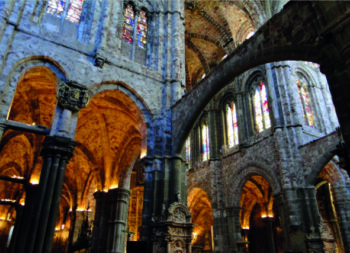The Interior Castle of St Teresa of Jesus of Ávila
Part 5 of 7
The Fifth Mansions mark the growth and development of the new gift of contemplation given in the Fourth Mansions. This section shows St Teresa’s obedience and love for the Lord in writing this book as well as a deep desire to share with others, especially her daughters in Carmel, how deeper prayer is apostolic and effective for the Church.
Prayer is the greatest power in the world and St Teresa wanted her monasteries to be on fire with prayer for the Church in turmoil. We can seek the same gift today.
This new fire within is not an abstract self-centred enterprise. What others think of us is irrelevant, as is what we think of ourselves. What God thinks of us is the most important thing, and this deep prayer, a gift of God, will set the world on fire with God’s love. In her own life St Teresa was busy founding Carmelite monasteries and helping many and, with the mark of the Cross, she endured all sorts of opposition. The contemplative life is in the real world, not an escape. So, she writes: This is what prayer is for, and high mystical favours too; always to produce good works and good works alone. Teresa always combines lofty idealism and practical good sense.
The prayer of union
Contemplation is the inflowing of divine knowledge and love in our soul. It is a gift and it is beyond the natural. Here, in the Fifth Mansions, it is called the prayer of union; a quieting of the soul and being taken up by God into his peace. The person is given the gift of a deep interior prayer. Hence, it cannot be described fully, but can be said to be like this or that. So, St Teresa writes: No one can describe them: the understanding is unable to comprehend them. She asked for God’s grace to describe them and it was given by the Holy Spirit. Hence, our reading the Interior Castle in 2021.
She describes this prayer as heaven on earth; a hidden treasure that we carry about in ourselves; a foretaste of divine joys. It brings with it a deep peace that nothing can disturb. It is the outcome of our Lord's own intervention. He will come into the centre of the soul without using a door, as he did when he came to his disciples and said “Peace be with you”; and when he left the sepulchre without removing the stone.
This prayer is like a seal on wax. The soul is sealed with his love. We can accept this seal. We can be quiet and consenting. In fact, St Teresa teaches that the real person of prayer is the one who seeks to do God’s will. That is the real test and the true result of God working in us.
Teresa also uses the image of the silkworm and spends some time on this analogy. How can an ugly worm become a lovely butterfly? So, in prayer, we become transformed like that worm, and as with the worm, the darkness is time of change.
The Song of Songs
She also uses the image of longing for the spiritual betrothal. The Biblical book Song of Songs has been a great source for describing God’s love for us and our love for him. In the Fifth Mansions there is no actual betrothal but much preparation. Just as a courting couple spend much time together, so the heart is set on God and God has set his heart on us.
Humble obedient love is the test of this stage of the spiritual life, not vague good feelings, which can be deceiving. Preoccupation with how far we have progressed is not helpful. True progress is indicated by a growing humble awareness of how great God is, and how we are merely little beggars. True union with God leaves us humbled, not proud.
There is no room in these Mansions for idle self-satisfaction. Also, we become more Christ-like in his compassion for the sins of the world. There is no feeling of superiority but a feeling of deep gratitude for God’s goodness to us. The experience is one of being caught up in God.
St Teresa insists that our lifestyle will change during this time. A light goes on inside the person. The free visit of God within us gives rise to greater patience, acceptance of the Cross, a growing desire to reject the world and its attractions. We are changed and know that it is totally God’s work. However, while we do little compared to God’s work, it is important that we be generous and forgiving. She writes: He will have it all -- in proportion to what you know you have given will your reward be great or small.
What must be do in order to grow in the Fifth Mansions?
Great are the wiles of the devil; for he will turn hell upside down a thousand times, in order to make us imagine we possess a virtue which in reality we do not. St Teresa is firmly based in the real world!
2] Dispose yourself
We cannot earn Fifth Mansion contemplative prayer, but St Teresa writes: …though in this work which our Lord himself does we can do nothing, yet by our disposing ourselves we may contribute much to induce his Majesty to bestow this favour upon us.
We dispose ourselves by …casting aside all self-love and our own will, and let us not adhere to any earthly thing; let us perform works of penance, prayer, mortification, obedience, and all the rest as you value.
3] Love your neighbour
Help the poor and little ones of this world. Forgive others who hurt you. Do not carry grudges. St Teresa writes: You will never arrive at full union unless you have perfect love of your neighbour.



 Entries(RSS)
Entries(RSS)